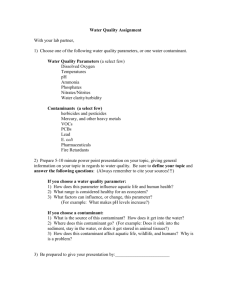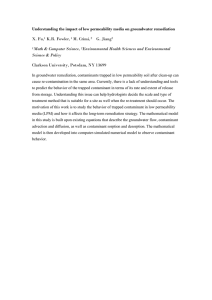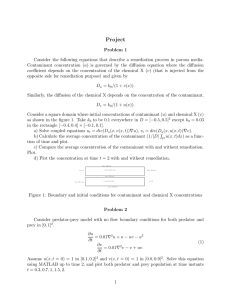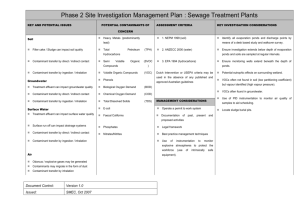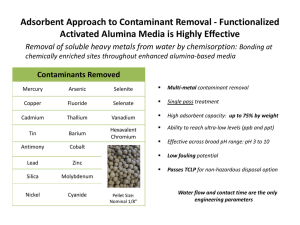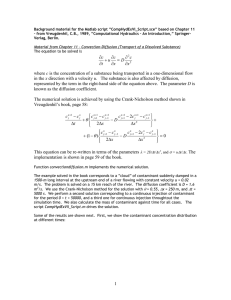DCM SCM CCM - sps2test.COM
advertisement
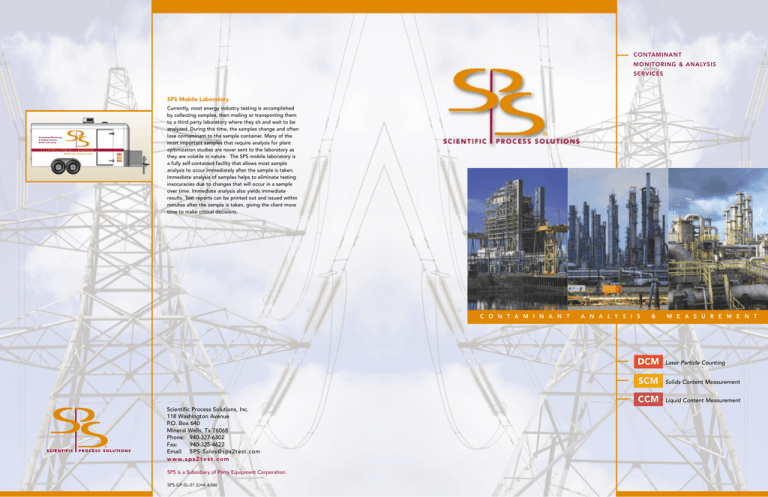
_ CONTAMINANT MONITORING & ANALYSIS SERVICES SPS Mobile Laboratory Currently, most energy industry testing is accomplished by collecting samples, then mailing or transporting them to a third party laboratory where they sit and wait to be analyzed. During this time, the samples change and often lose contaminant to the sample container. Many of the most important samples that require analysis for plant optimization studies are never sent to the laboratory as they are volatile in nature. The SPS mobile laboratory is a fully self-contained facility that allows most sample analysis to occur immediately after the sample is taken. Immediate analysis of samples helps to eliminate testing inaccuracies due to changes that will occur in a sample over time. Immediate analysis also yields immediate results. Test reports can be printed out and issued within minutes after the sample is taken, giving the client more time to make critical decisions. ® C O N T A M I N A N T A N A L Y S I S _ _ _ Scientific Process Solutions, Inc. 118 Washington Avenue P.O. Box 640 Mineral Wells, Tx 76068 Phone: 940-327-6302 Fax: 940-325-4622 Email: SPS-Sales@sps2test.com w w w. s p s 2 t e s t . c o m SPS is a Subsidiary of Perry Equipment Corporation. SPS-GP-SL-01 (LHA 4/06) & M E A S U R E M E N T DCM Laser Particle Counting SCM Solids Content Measurement CCM Liquid Content Measurement Natural gas processing plants Natural gas dehydration plants [ Scientific Process Solutions (SPS) utilizes different testing protocols to measure the many types of contaminant found in today’s pipelines. Gas and liquid pipelines Compressor stations Refinery gas, liquid, and liquid/liquid systems Filtration and separation equipment performance analysis K N O W T H E C O N TA M I N A N T B E F O R E S P E N D I N G V A L U A B L E C A P I TA L F U N D S __ __ __ __ __ __ __ __ __ Natural gas fired power plant fuel gas qualification __ __ __ __ __ __ __ __ __ __ __ __ __ __ __ __ __ __ __ T O TA L C O N TA M I N A N T A N A LY S I S S Y S T E M A P P L I C AT I O N S G A S C L E A N L I N E S S Q U A L I F I C AT I O N T E S T I N G ] The selection of filtration and separation equipment can be a difficult task. Filtration and separation companies offer numerous different technologies to handle different contaminants for different applications. The key word being "different". Contaminants and contaminant mixtures are almost always different. The key to selecting the optimum separation technology for a service is to have real data on the contaminant’s volume, size, and physical characteristics. All too often, filtration and separation equipment is selected, purchased, and installed with very little known about the contaminant. The result often produces damaged downstream equipment and/or over budget operational cost due to poor performance. SPS was developed as an entity dedicated to providing the scientific data needed to make sound filtration and separation selection decisions. Today’s gas turbines and other critical gas systems are extremely sensitive to liquid, liquid aerosol, and solids contamination. Most manufacturers have developed gas cleanliness requirement specifications for fuel and feed gas streams. The SPS "Total Contaminant Analysis System", using different testing protocols, provides the scientific data needed to qualify gas streams for use with contaminant sensitive equipment. Filtration and separation equipment feasibility and design selection Positive preventative protection monitoring Solids Contaminant Measurement DCM T E S T I N G C A PA B I L I T I E S On site natural gas laser aerosol particle counting and distribution measurement SCM On site natural gas free liquid content measurement and analysis On site natural gas total suspended solids (TSS) measurement On site natural gas microscopic solids particle sizing and distribution On site liquid total suspended solids (TSS) measurement Gas On site liquid contaminant microscopic particle sizing and distribution Solids Aerosols and Free Liquids On site liquid surface tension measurement Direct Contaminant Measurement On site liquid interfacial surface tension measurement Liquid contamination is often present in natural gas pipelines as an aerosol. Liquid aerosols, although small in mass, can build up over time and have damaging effects on downstream equipment. The Direct Contaminant Measurement (DCM) high pressure laser particle counter is used to measure the size, distribution, and content of aerosols in a pipeline. In order to insure that a representative amount of contaminant aerosol is measured, the gas will be sampled isokinetically. The pipeline pressure and temperature are also maintained during DCM measurement as not to vaporize or condense additional aerosols while testing. Data collected from DCM measurement is often used to determine if costly aerosol removing filtration equipment is actually required in a system. On site liquid moisture content Contaminant identification analysis C O N S U LT I N G S E R V I C E S Gas fired power plant fuel qualification analysis and troubleshooting Natural gas dehydration plant operational cost optimization Natural gas processing plant operational cost optimization Natural gas compressor station operational cost optimization Coalescer Contaminant Measurement photo Piping header and bypass configurations Separator design selection and troubleshooting Scrubber design selection and troubleshooting Total Counts CCM Filtration equipment design selection and troubleshooting Computational fluid dynamic (CFD) studies Micron Levels Measured Contaminant Level Readings Sample Time Solid particle contamination found in natural gas and liquid pipelines will act to wear rotating components, foul heat exchangers, contaminate cooling liquids, plug processing equipment, as well as enhance numerous other processing and equipment problems. The Solids Contaminant Measurement (SCM) system utilizes a filter disk holder assembly to isokinetically sample and collect solid contaminant in a pipeline. Once the contaminant is collected it will be measured according to industry standard gravimetric measurement practices to provide total suspended solids (TSS) data. Particles collected on the filter disk can be microscopically analyzed to provide a particle size distribution. Data produced can then be used to evaluate a filter’s performance or to determine if additional filtration equipment is needed. Data from SCM testing is commonly used to select filter element types and ratings that will optimize performance to lower system operational cost. As liquid contaminant increases in volume it will start to travel along the sides and bottom of a gas pipeline as a liquid stream. The volume of a stream of liquid in a pipeline is important to know prior to the selection and sizing of separation equipment. The Coalescer Contaminant Measurement (CCM) skid utilizes a gas coalescer vessel to measure free liquid streams in a gas pipeline. Solids collected on the testing element can also be qualitatively analyzed with a microscope for size and general content. The CCM skid can be used to measure the performance of separation equipment. The CCM system is also commonly used to measure the contaminant content in a pipeline to determine the type of separation equipment required for optimal economic performance. Natural gas processing plants Natural gas dehydration plants [ Scientific Process Solutions (SPS) utilizes different testing protocols to measure the many types of contaminant found in today’s pipelines. Gas and liquid pipelines Compressor stations Refinery gas, liquid, and liquid/liquid systems Filtration and separation equipment performance analysis K N O W T H E C O N TA M I N A N T B E F O R E S P E N D I N G V A L U A B L E C A P I TA L F U N D S __ __ __ __ __ __ __ __ __ Natural gas fired power plant fuel gas qualification __ __ __ __ __ __ __ __ __ __ __ __ __ __ __ __ __ __ __ T O TA L C O N TA M I N A N T A N A LY S I S S Y S T E M A P P L I C AT I O N S G A S C L E A N L I N E S S Q U A L I F I C AT I O N T E S T I N G ] The selection of filtration and separation equipment can be a difficult task. Filtration and separation companies offer numerous different technologies to handle different contaminants for different applications. The key word being "different". Contaminants and contaminant mixtures are almost always different. The key to selecting the optimum separation technology for a service is to have real data on the contaminant’s volume, size, and physical characteristics. All too often, filtration and separation equipment is selected, purchased, and installed with very little known about the contaminant. The result often produces damaged downstream equipment and/or over budget operational cost due to poor performance. SPS was developed as an entity dedicated to providing the scientific data needed to make sound filtration and separation selection decisions. Today’s gas turbines and other critical gas systems are extremely sensitive to liquid, liquid aerosol, and solids contamination. Most manufacturers have developed gas cleanliness requirement specifications for fuel and feed gas streams. The SPS "Total Contaminant Analysis System", using different testing protocols, provides the scientific data needed to qualify gas streams for use with contaminant sensitive equipment. Filtration and separation equipment feasibility and design selection Positive preventative protection monitoring Solids Contaminant Measurement DCM T E S T I N G C A PA B I L I T I E S On site natural gas laser aerosol particle counting and distribution measurement SCM On site natural gas free liquid content measurement and analysis On site natural gas total suspended solids (TSS) measurement On site natural gas microscopic solids particle sizing and distribution On site liquid total suspended solids (TSS) measurement Gas On site liquid contaminant microscopic particle sizing and distribution Solids Aerosols and Free Liquids On site liquid surface tension measurement Direct Contaminant Measurement On site liquid interfacial surface tension measurement Liquid contamination is often present in natural gas pipelines as an aerosol. Liquid aerosols, although small in mass, can build up over time and have damaging effects on downstream equipment. The Direct Contaminant Measurement (DCM) high pressure laser particle counter is used to measure the size, distribution, and content of aerosols in a pipeline. In order to insure that a representative amount of contaminant aerosol is measured, the gas will be sampled isokinetically. The pipeline pressure and temperature are also maintained during DCM measurement as not to vaporize or condense additional aerosols while testing. Data collected from DCM measurement is often used to determine if costly aerosol removing filtration equipment is actually required in a system. On site liquid moisture content Contaminant identification analysis C O N S U LT I N G S E R V I C E S Gas fired power plant fuel qualification analysis and troubleshooting Natural gas dehydration plant operational cost optimization Natural gas processing plant operational cost optimization Natural gas compressor station operational cost optimization Coalescer Contaminant Measurement photo Piping header and bypass configurations Separator design selection and troubleshooting Scrubber design selection and troubleshooting Total Counts CCM Filtration equipment design selection and troubleshooting Computational fluid dynamic (CFD) studies Micron Levels Measured Contaminant Level Readings Sample Time Solid particle contamination found in natural gas and liquid pipelines will act to wear rotating components, foul heat exchangers, contaminate cooling liquids, plug processing equipment, as well as enhance numerous other processing and equipment problems. The Solids Contaminant Measurement (SCM) system utilizes a filter disk holder assembly to isokinetically sample and collect solid contaminant in a pipeline. Once the contaminant is collected it will be measured according to industry standard gravimetric measurement practices to provide total suspended solids (TSS) data. Particles collected on the filter disk can be microscopically analyzed to provide a particle size distribution. Data produced can then be used to evaluate a filter’s performance or to determine if additional filtration equipment is needed. Data from SCM testing is commonly used to select filter element types and ratings that will optimize performance to lower system operational cost. As liquid contaminant increases in volume it will start to travel along the sides and bottom of a gas pipeline as a liquid stream. The volume of a stream of liquid in a pipeline is important to know prior to the selection and sizing of separation equipment. The Coalescer Contaminant Measurement (CCM) skid utilizes a gas coalescer vessel to measure free liquid streams in a gas pipeline. Solids collected on the testing element can also be qualitatively analyzed with a microscope for size and general content. The CCM skid can be used to measure the performance of separation equipment. The CCM system is also commonly used to measure the contaminant content in a pipeline to determine the type of separation equipment required for optimal economic performance. _ CONTAMINANT MONITORING & ANALYSIS SERVICES SPS Mobile Laboratory Currently, most energy industry testing is accomplished by collecting samples, then mailing or transporting them to a third party laboratory where they sit and wait to be analyzed. During this time, the samples change and often lose contaminant to the sample container. Many of the most important samples that require analysis for plant optimization studies are never sent to the laboratory as they are volatile in nature. The SPS mobile laboratory is a fully self-contained facility that allows most sample analysis to occur immediately after the sample is taken. Immediate analysis of samples helps to eliminate testing inaccuracies due to changes that will occur in a sample over time. Immediate analysis also yields immediate results. Test reports can be printed out and issued within minutes after the sample is taken, giving the client more time to make critical decisions. ® C O N T A M I N A N T A N A L Y S I S _ _ _ Scientific Process Solutions, Inc. 118 Washington Avenue P.O. Box 640 Mineral Wells, Tx 76068 Phone: 940-327-6302 Fax: 940-325-4622 Email: SPS-Sales@sps2test.com w w w. s p s 2 t e s t . c o m SPS is a Subsidiary of Perry Equipment Corporation. SPS-GP-SL-01 (LHA 4/06) & M E A S U R E M E N T DCM Laser Particle Counting SCM Solids Content Measurement CCM Liquid Content Measurement
